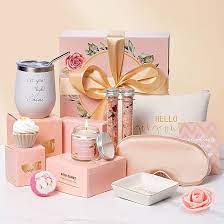Gifts: The Art of Giving and Receiving
Gift-giving is a timeless tradition that brings joy and strengthens relationships. Whether it’s for a birthday, anniversary, or holiday celebration, the act of giving a gift is an opportunity to show someone how much they mean to you. But what makes a gift truly special? Is it the price tag or the thought behind it?
The true essence of gift-giving lies in the sentiment and effort put into selecting the perfect present. It’s about understanding the recipient’s preferences, interests, and needs. A well-thought-out gift demonstrates that you value their uniqueness and have taken the time to choose something meaningful.
When searching for that ideal gift, consider the person’s hobbies or passions. Are they an avid reader? A book by their favorite author or a unique bookmark might be just what they need. Do they enjoy cooking? High-quality kitchen gadgets or a personalized recipe book could make their culinary adventures even more enjoyable.
Sometimes, experiences can be the most memorable gifts. Treat your loved ones to a spa day, concert tickets, or an adventure-filled weekend getaway. These shared moments create lasting memories and strengthen bonds.
It’s important to remember that gifts need not be extravagant to be appreciated. Often, it’s the small gestures that hold immense value. A handwritten note expressing your love and gratitude can touch someone’s heart in ways that material possessions cannot.
Personalization adds an extra touch of thoughtfulness to any gift. Engraving initials on jewelry, monogramming towels or bags, or customizing items with photographs all demonstrate your attention to detail and make the recipient feel truly special.
In recent years, there has been a growing trend towards eco-friendly gifting. Sustainable options such as reusable water bottles, organic skincare products, or handmade crafts not only show care for the environment but also reflect conscious consumerism.
Gift-giving should extend beyond special occasions; spontaneous surprises can brighten someone’s day. It could be a small token of appreciation for a friend who has been there for you or a random act of kindness to a stranger in need. These unexpected gestures can have a profound impact on both the giver and the receiver.
Lastly, let’s not forget the art of receiving gifts graciously. Expressing genuine gratitude and appreciation is just as important as selecting the perfect present. Remember, it’s not about the material value, but rather the sentiment behind the gift that matters most.
In conclusion, gift-giving is an art that allows us to connect with others on a deeper level. It’s an opportunity to celebrate and cherish relationships, while also expressing our love, gratitude, and admiration. So next time you’re searching for that perfect gift, remember to put thought into it and let your heart guide you.
Commonly Asked Questions About Gift Giving in English (UK)
- What is the best gift I can give someone?
- How do I choose a meaningful gift?
- What are some unique gifts for special occasions?
- What are some good gifts for children?
- How much should I spend on a gift?
- How do I wrap a present nicely?
What is the best gift I can give someone?
The best gift you can give someone ultimately depends on their individual preferences, interests, and needs. However, there are a few universal ideas that often resonate with people:
- Personalized Gifts: Customizing a gift to reflect the recipient’s personality or experiences can make it truly special. Consider engraving their initials on jewelry, creating a photo album filled with cherished memories, or commissioning a piece of artwork that holds significance to them.
- Experiences: Sometimes, the most memorable gifts are experiences rather than physical items. Treat your loved ones to a concert, theatre show, cooking class, or a weekend getaway. These shared moments create lasting memories and can be more valuable than material possessions.
- Thoughtful and Practical Items: Pay attention to what the person needs or has mentioned wanting in passing conversations. It could be something as simple as a useful gadget for their hobbies or a book by their favorite author.
- Acts of Service: Offering your time and assistance can be incredibly meaningful. Help them with household chores, run errands on their behalf, or cook them a delicious meal. These acts of service show your care and support.
- Donation in Their Name: If the person is passionate about a particular cause or charity, consider making a donation in their name. This not only supports something they care about but also demonstrates thoughtfulness and empathy.
Remember that the value of a gift lies not in its price tag but in the sentiment behind it. The most important thing is to show that you have considered the person’s interests and desires when selecting your gift. Ultimately, it’s the thoughtfulness and effort you put into choosing something meaningful that will make it special for them.
How do I choose a meaningful gift?
Choosing a meaningful gift requires thoughtful consideration and understanding of the recipient’s preferences, interests, and needs. Here are some steps to help you select a gift that will truly resonate with them:
- Pay attention to their interests: Take note of the recipient’s hobbies, passions, or activities they enjoy. Consider what they spend their time doing or talking about. This will give you insights into what types of gifts align with their interests.
- Consider their needs: Think about any practical items that the person may need or have mentioned wanting. It could be something for their home, work, or personal use. A gift that fulfills a specific need shows that you’ve paid attention to their daily life and care about their well-being.
- Personalize it: Adding a personal touch to a gift can make it even more meaningful. Consider customizing the item with their name, initials, or a special message. This shows that you’ve put thought and effort into making the gift unique to them.
- Recall shared experiences: Reflect on any memorable moments or experiences you’ve had together. A gift that reminds them of those special times can evoke nostalgia and strengthen your bond.
- Listen and observe: Pay attention to any hints or comments they may have dropped in conversations leading up to the occasion for which you’re selecting the gift. They might mention something they’ve been eyeing or express interest in a particular item.
- Think about their values: Consider the recipient’s values and beliefs when choosing a gift. If they are passionate about sustainability, for example, opt for eco-friendly products or experiences aligned with environmental consciousness.
- Get creative: Sometimes, the most meaningful gifts are ones that show your thoughtfulness and creativity rather than being store-bought items. Handmade crafts, heartfelt letters, or personalized photo albums can convey your love and appreciation in a unique way.
- Quality over quantity: Remember that it’s not about the price tag or extravagance of the gift, but rather the sentiment behind it. Focus on finding something of good quality that reflects their tastes and preferences.
- Consider their lifestyle: Take into account the recipient’s lifestyle and practicality. If they have a busy schedule, a gift that helps them relax or saves time could be appreciated. If they love to travel, consider items that enhance their adventures.
- Trust your instincts: Ultimately, trust your instincts and go with what feels right. Your genuine thoughtfulness and effort will shine through in whatever gift you choose.
Remember, the most meaningful gifts are those that show you truly know and care about the person receiving them. The joy of gift-giving comes from making someone feel seen, appreciated, and loved through your thoughtful gesture.
What are some unique gifts for special occasions?
When it comes to special occasions, finding unique gifts can make the celebration even more memorable. Here are some ideas to inspire you:
- Personalized photo album or scrapbook: Compile cherished memories and create a custom photo album or scrapbook filled with photos, mementos, and heartfelt messages.
- Customized artwork: Commission a local artist to create a one-of-a-kind piece of art that reflects the recipient’s personality or interests.
- Name a star: Give the gift of stargazing by naming a star after your loved one. They will receive a certificate and the coordinates to locate their very own star in the night sky.
- Adventure experience: Plan an adrenaline-filled adventure such as hot air balloon rides, skydiving, or bungee jumping for the thrill-seeker in your life.
- Subscription box: Surprise them with a subscription box tailored to their interests, whether it’s gourmet snacks, books, beauty products, or even plants.
- Handcrafted jewelry: Seek out local artisans who create unique jewelry pieces using unconventional materials or techniques.
- Personalized song or poem: Commission a musician or poet to write and perform an original song or poem dedicated to the recipient.
- Cooking class or food tour: Treat them to a culinary experience by booking a cooking class where they can learn new recipes or take them on a food tour exploring local delicacies.
- DNA ancestry kit: Uncover their heritage and genealogy with an at-home DNA ancestry kit that provides insights into their family history and origins.
- Custom-made fragrance: Work with a perfumer to create a signature scent tailored specifically for them based on their preferences and personality.
Remember, the key is to think outside the box and consider what truly resonates with the individual’s interests and passions. By choosing something unique and personalized, you’ll show how much thought you’ve put into making their special occasion extraordinary.
What are some good gifts for children?
When it comes to choosing gifts for children, it’s important to consider their interests, age, and developmental stage. Here are some ideas for age-appropriate and engaging gifts:
- Books: Encourage a love for reading by gifting age-appropriate books that match their interests or introduce them to new topics.
- Building blocks or construction sets: Toys like LEGO, building blocks, or magnetic tiles stimulate creativity, problem-solving skills, and fine motor development.
- Arts and crafts kits: Let their imagination soar with art supplies like coloring sets, painting kits, or DIY craft projects that allow them to express themselves creatively.
- Puzzles: Age-appropriate puzzles help develop problem-solving skills and cognitive abilities while providing hours of entertainment.
- Board games: Choose games suitable for their age group that promote social interaction, cooperation, and strategic thinking.
- Outdoor toys: Encourage physical activity with items such as bicycles, scooters, sports equipment like soccer balls or basketball hoops, or even a kite for some outdoor fun.
- Musical instruments: Introduce the joy of music with child-friendly instruments like keyboards, mini guitars, or percussion sets to nurture their musical talents.
- Science kits: Inspire curiosity with science experiment kits that allow children to explore concepts like chemistry, physics, or biology in a hands-on way.
- Stuffed animals or plush toys: Soft toys can provide comfort and companionship while encouraging imaginative play and storytelling.
- Educational apps or subscriptions: Consider digital gifts such as educational apps or subscriptions that offer interactive learning experiences tailored to their age group.
Remember to consider any specific interests the child may have; whether they love animals, sports, space exploration, or superheroes – tailoring the gift to their passions will make it even more special. Lastly, always prioritize safety by ensuring the gifts are age-appropriate and meet safety standards.
How much should I spend on a gift?
Determining how much to spend on a gift can vary depending on various factors, including your relationship with the recipient, the occasion, and your personal financial situation. There is no one-size-fits-all answer to this question, as it ultimately depends on your comfort level and what you feel is appropriate.
Consider the nature of the relationship: For close family members or lifelong friends, you might be willing to spend more on a special occasion. On the other hand, for acquaintances or colleagues, a modest gift may be more suitable.
Consider the occasion: Certain occasions may call for more significant gifts, such as milestone birthdays or weddings. In these cases, you might want to allocate a larger budget. For smaller occasions or casual gatherings, a thoughtful yet less expensive gift can still be meaningful.
Consider your financial situation: It’s essential to set a budget that aligns with your financial circumstances and doesn’t strain your resources. Remember that the value of a gift is not solely determined by its price tag but also by the thought and effort put into selecting it.
Ultimately, what matters most is the sentiment behind the gift. A well-chosen present that reflects the recipient’s interests and preferences can be much more meaningful than an expensive but impersonal item. Focus on finding something that will bring joy and show your appreciation rather than solely considering its monetary value.
If you’re uncertain about how much to spend, it can be helpful to discuss it with friends or family members who may have insight into what is customary for specific occasions or relationships. Ultimately, though, trust your instincts and choose a gift that feels right for both you and the recipient.
How do I wrap a present nicely?
Wrapping a present nicely adds an extra touch of thoughtfulness and excitement to the gift-giving experience. Here are some steps to help you wrap a present beautifully:
- Choose the Right Materials: Start by gathering all the necessary materials, including wrapping paper, scissors, tape, ribbon or bows, and any additional embellishments like gift tags or stickers. Select a wrapping paper that matches the occasion or the recipient’s preferences.
- Measure and Cut: Lay out your wrapping paper on a flat surface and place the gift in the center. Ensure you have enough paper to cover the entire item by pulling up two opposite sides of the paper and overlapping them slightly in the middle. Cut off any excess paper.
- Fold and Secure: Take one side of the wrapping paper and fold it over the gift, ensuring it covers at least half of it. Use tape to secure this side in place. Repeat this step with the other side, making sure both edges meet neatly in the middle.
- Fold and Tuck: To create clean edges on each end of your wrapped gift, fold one end of the paper towards the center at a 45-degree angle. Then fold this flap down tightly against the gift and secure it with tape. Repeat this process on the other side.
- Add Embellishments: Now it’s time to add some decorative elements! Tie a ribbon around your gift, crossing it over on top for an elegant look or tying it into a bow for a more playful touch. You can also attach a small gift tag with a personalized message or add stickers for extra flair.
- Finishing Touches: Take a moment to inspect your wrapped present from all angles, ensuring that everything is secure and neat. Smooth out any wrinkles or creases in the wrapping paper for a polished appearance.
Remember, practice makes perfect! Don’t be discouraged if your first attempt doesn’t turn out exactly as you envisioned. With a little patience and creativity, you’ll soon become an expert at wrapping presents nicely. And most importantly, enjoy the process and have fun making someone’s day a little brighter with your beautifully wrapped gift!



